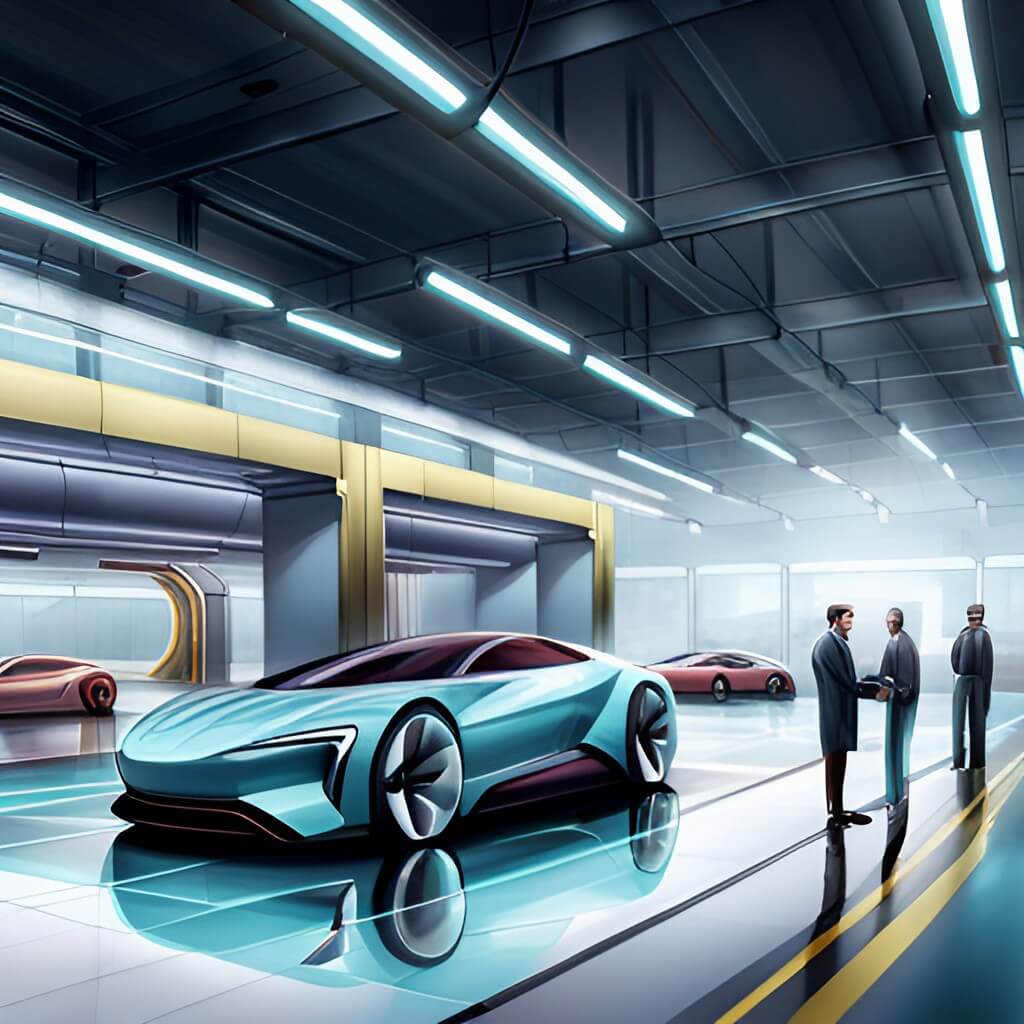The automotive industry has experienced significant transformations in recent times, driven by the emergence of electric vehicles, autonomous driving, and the sharing economy. Now, blockchain technology is positioned to become the latest disruptor in this sector, with the potential to revolutionize various aspects, from vehicle manufacturing to ownership and maintenance.
Blockchain, the decentralized ledger technology famous for powering cryptocurrencies like Bitcoin, has garnered attention across industries for its secure data storage and sharing capabilities. In the automotive domain, blockchain can be leveraged to enhance supply chain management, vehicle tracking, and data security, among other applications.
One of the most promising uses of blockchain in the automotive industry lies in supply chain management. The intricate network of suppliers, manufacturers, and distributors involved in creating a single vehicle can be challenging to track and manage efficiently.
However, blockchain offers a solution by providing a secure, transparent, and tamper-proof record of every transaction and interaction between the parties involved. This streamlined approach can reduce inefficiencies, minimize the risk of fraud, and ensure that all stakeholders are held accountable for their actions.
In addition to optimizing supply chain management, blockchain offers valuable applications in vehicle tracking and data security. At present, essential vehicle information such as ownership, maintenance history, and mileage is stored in centralized databases, making them susceptible to hacking and data breaches.
However, by transitioning this data to a decentralized blockchain, it becomes significantly more challenging for hackers to access and manipulate it. The inherent transparency of blockchain further ensures that all stakeholders involved in a vehicle’s lifecycle can readily access and verify its history, creating a formidable deterrent against fraudsters attempting to sell stolen or counterfeit vehicles.
One of the most captivating possibilities for blockchain in the automotive industry lies in its potential to revolutionize vehicle ownership and usage models. The emergence of the sharing economy has prompted a growing trend towards ride-sharing services like Uber and Lyft, leading many individuals to choose these options over traditional car ownership.
Blockchain technology can facilitate this shift by enabling secure, peer-to-peer transactions between vehicle owners and users. This opens up new avenues for decentralized car-sharing platforms, where owners can rent out their vehicles directly to others when not in use, eliminating the need for a centralized intermediary like a conventional car rental company. Such advancements in vehicle usage models could redefine the way people approach transportation and ownership.
Blockchain Technology: Transforming Industries
Blockchain technology boasts a compelling structure, sophisticated functionalities, and an extensive array of functions within its shared ledger systems. These attributes hold the potential to revolutionize the performance of healthcare and have already found their way into various industries, including the automobile sector.
In the domain of finance, Bitcoin technology leverages a peer-to-peer interface to ensure secure transactions. In the automotive industry, the implementation of Blockchain introduces intelligent features like decentralization, efficient record management, and seamless digital money transfers facilitated by smart contracts. This, in turn, greatly assists logistics operations.
The introduction of automation technology further enhances transparency and enables direct interactions between parties involved in transactions. By eliminating the need for mediators and third-party authorities, this advancement saves valuable time and resources, paving the way for companies to explore novel business models and exciting opportunities for the future.
Advantages of Blockchain in the Automotive Industry
Blockchain technology has emerged as a powerful tool with several advantages for the automotive industry, owing to its immutable, decentralized nature, transparency, and efficient functioning system.
Transparency and Security
The implementation of blockchain in the automotive industry offers enhanced transparency and security. Each network participant gains access to all financial transactions and contracts, reducing transaction-related risks significantly. The secure storage of transactions ensures that companies can confidently choose suppliers without being susceptible to fraudulent supplies or counterfeit parts.
Furthermore, the use of smart contracts, which are legally enforceable and permanent, helps maintain transparency in a sector heavily reliant on globally sourced raw materials, minimizing the potential for discrepancies and inconsistencies.
Management and Efficiency
Blockchain streamlines documentation, traceability, and quality control processes, facilitating efficient management within the automotive industry. Financial transactions and order placements are organized on the blockchain, enabling companies and suppliers to make well-informed decisions without errors or malicious intent.
The system’s organized layout provides a comprehensive view of original parts, making it easier to detect modifications or manufacturing defects. This ensures better management and efficiency in the entire supply chain.
Cost-Effective
One of the notable advantages of blockchain is its potential to reduce costs in various departments, including audit, reporting, and reviews. With no intermediaries involved in financial transactions, production costs are minimized. The high efficiency of blockchain enables greater manufacturing capacity and optimized resource utilization. Additionally, blockchain’s digitalization and vehicle tracking capabilities ensure compliance with regulatory requirements, further contributing to cost-effectiveness.
User-Friendly
Blockchain technology enhances user-friendliness for consumers in the automotive industry. Through digitalization, consumers gain complete transparency regarding a vehicle’s history, source, and manufacturing details. This simplifies the process of verifying, transferring ownership, and selling products, eliminating tedious paperwork and reducing the likelihood of fraud.
A well-organized supply chain technology improves the overall quality of goods while lowering the cost of production, ultimately benefiting consumers.
Data Storage
Blockchains serve as a versatile platform for storing, organizing, and interpreting data without limitations. In the dynamic automotive industry, particularly with the advancement of electrification and self-driving technology, extensive data must be securely stored. Blockchains offer a solution to safeguard sensitive information about car owners, ensuring passenger safety and optimizing vehicle performance through data from sensors recorded on the blockchain.
Optimizing the Supply Chain
The automotive supply chain plays a crucial role in the industry’s success. By implementing blockchain in the automotive sector, manual activities within the supply chain can be automated, leading to increased efficiency.
The use of blockchain technology enables the optimization of the entire supply chain, making it scalable as the business expands. Smart contracts, robust mobile applications within the blockchain, facilitate automation, saving time and reducing costs, thereby streamlining operations like customer data management and ownership transfer validations.
Quality Control at Its Best
The risk of counterfeit spare parts in large distributed supply chains poses a significant challenge for automakers. Identifying such parts can be laborious and costly. Blockchain offers a solution to this problem by ensuring all parts’ authenticity. Leveraging smart contracts and real-time identification, automakers can verify parts with ease. By matching the hash ID with the previous hash code, the authenticity of parts can be assured, saving time and optimizing operations.
Auto Insurance
Insurance companies stand to benefit from the essential services provided by blockchain technology. Manufacturers can maximize production utilization by utilizing the technology system for documentation of original parts.
Smart contracts offer a means for companies to protect themselves from potential issues and verify the processes carried out by car insurance providers. Through blockchain, insurance users can assess whether a vehicle requires significant repairs before they occur, by checking technical issues or verifying data provided by the applicant.
Vehicle Valuation
Blockchain technology has revolutionized the process of vehicle valuation, making it more reliable and transparent. Before blockchain application development, estimating vehicles relied on available data, making it difficult to detect fraud and bias in estimates.
With blockchain’s decentralized and transparent nature, services are more visible, enabling fair and accurate vehicle valuations. The use of blockchain in this context enhances trust and credibility in the valuation process.
Blockchain Use Cases in the Automotive Industry
The automotive industry has numerous opportunities to leverage blockchain technology, primarily benefiting from its key advantages. Here are some of the most interesting use cases of blockchain technology in the automotive sector.
Combating Counterfeit Car Parts
In the early months of 2017, Abu Dhabi authorities seized over 500,000 counterfeit auto spare parts valued at approximately $4 million in a single day. The magnitude of the counterfeit car parts market is staggering, causing significant financial losses for manufacturers like Nissan, which reportedly faces an annual loss of around $60 million in the Arab Emirates alone due to counterfeit parts.
Addressing this pressing issue requires a reliable solution. Implementing unique radio-frequency identification (RFID) tags, car manufacturers can establish proof of provenance for their spare auto parts and trace their location within the supply chain. All relevant information about each vehicle can then be securely stored in a public ledger, ensuring transparency and authenticity.
Leveraging blockchain to validate the origin of auto spare parts can lead to substantial cost reductions in recall activities, protecting both manufacturers’ finances and, most importantly, human lives, particularly concerning critical components like airbags.
Blockchain in Cargo Shipping
The integration of blockchain technology in the automotive industry brings numerous benefits to shipping companies. The shipping sector, with its vast network of communication between transportation providers, freight forwarders, customs brokers, governments, ports, and warehouses, often faces complexity in managing data flow. Traditionally, shipping companies store data about a cargo in their silos, making it inaccessible to clients.
To address these challenges, global cargo shipper Maersk partnered with IBM, adopting blockchain to instill trust and transparency in their supply chain. Utilizing smart contracts, Maersk automated paperwork, including agreements and contracts, reducing point-to-point communications with their automotive supply chain members. This implementation streamlined cargo shipping, making it more efficient and cost-effective.
With blockchain, all supply chain members gain access to shipment information, such as document submissions, cargo location, possession details, and destination, at any given moment. The technology provides a secure data exchange and a tamper-proof repository for cargo documents and shipping events. As a result, blockchain significantly reduces delays, prevents fraud, and saves millions of dollars for shipping companies.
Accelerating Self-Driving Development through Blockchain
While Tesla has introduced cars with built-in autopilot capabilities, fully autonomous self-driving cars still face imperfections, relying heavily on road markings and signs. To expedite the development of driverless vehicles, manufacturers must gather and process vast amounts of data.
According to Chris Ballinger from the Toyota Research Institute, blockchain technology will play a crucial role in expediting the arrival of autonomous cars on our roads. Distributed ledgers and blockchains facilitate the seamless transfer of vital data between vehicle owners, researchers, and manufacturers.
This streamlined data exchange enables car manufacturers to access the required information faster, expediting the production of fully autonomous electric vehicles. As a result, the journey to achieving safer and more advanced self-driving technology becomes more achievable than ever before.
Conclusion
Blockchain technology holds immense potential to transform the automotive industry in various ways. From optimizing supply chain management to enhancing data security, streamlining vehicle tracking, and enabling innovative ownership models, blockchain brings transparency, efficiency, and trust to the automotive ecosystem. By leveraging this decentralized and tamper-proof technology, the automotive industry can overcome challenges, reduce fraud, and improve overall operations.
As technology continues to advance, blockchain’s adoption in the automotive sector is poised to revolutionize the way vehicles are manufactured, owned, and operated, creating a more connected and sustainable future for the mobility industry.





